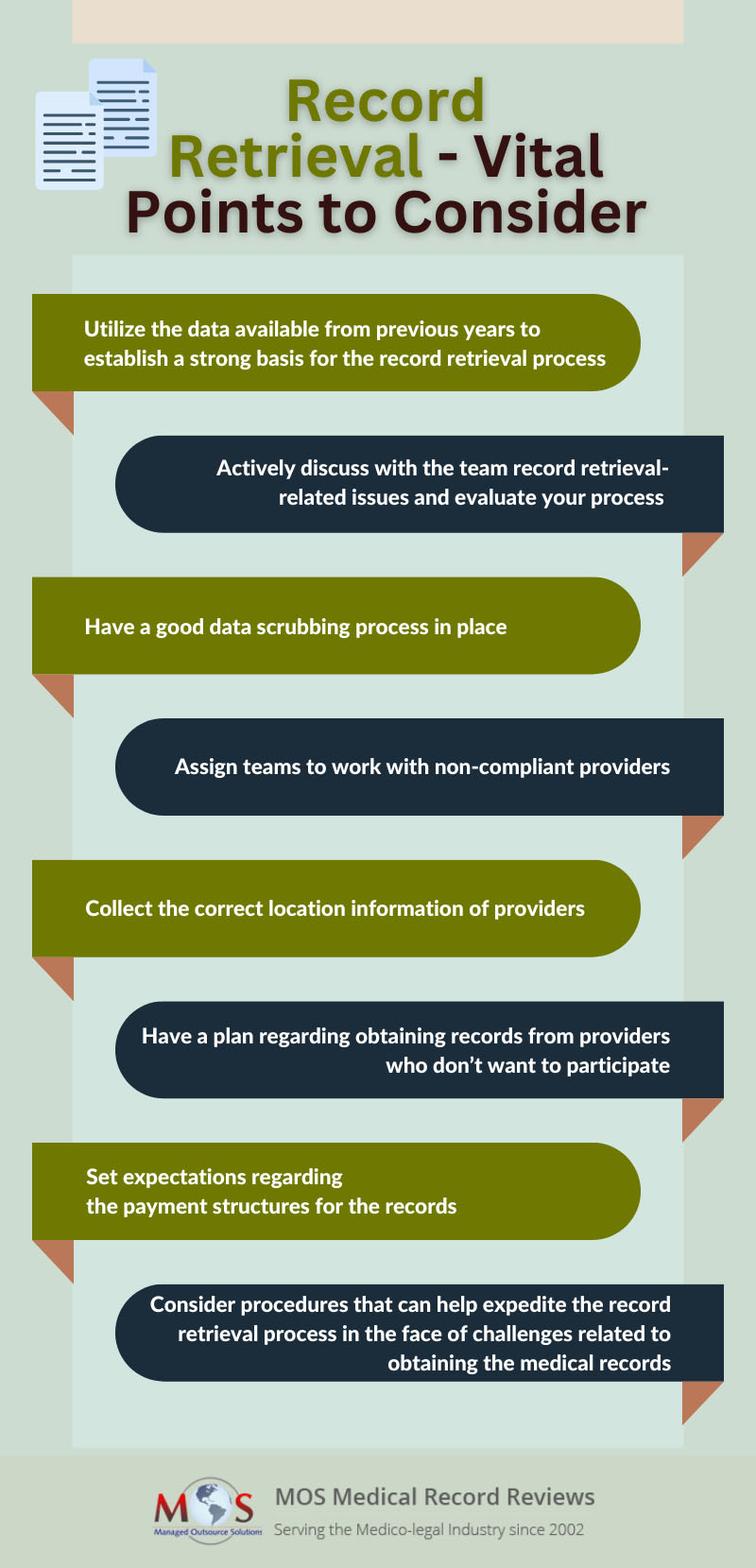Medical record retrieval is an important service for payers that need to collect medical records for risk adjustment programs and quality measurements, and position themselves for positive HEDIS scores. Retrieving medical records is not an easy process mainly because of the HIPAA requirements involved, which makes it difficult to procure patient medical records from hospitals, physicians and other healthcare professionals. Attorneys also need access to medical records when handling claims related to personal injury, medical malpractice, workers’ compensation, medical treatment and so on. When it comes to securing medical records, efficiency, perseverance, and timeliness are absolutely necessary.
If the medical record retrieval process is fast, you have more time to evaluate them for completeness and also determine the accuracy of data abstraction. Since incomplete entries and discrepancies can have a negative impact on the data extracted, it is vital to ensure that all the records collected are complete. The important thing here is to have a clear idea regarding which records to collect, what they should include, and the best way to retrieve them without frustrating the healthcare providers.
MOS Medical Record Reviews provides efficient and timely medical record retrieval services.
Considering an In-house Solution?
Attorneys and health insurers utilizing an in-house workflow automation tool to expedite the record retrieval process can focus on the following considerations.
Be quick to adopt a good workflow solution: The earlier you adopt a good solution, the better. When you adopt new technology, you get to enjoy major benefits amidst the challenging health insurance quality and risk adjustment regulations.
Go for a complete workflow solution: This means you must have in place a workflow solution that performs medical record collection, management, and reporting. Ideally, it should have an integrated audit functionality.
Get secure virtual printing (SVP) as an option: Choose a product that enables secure sharing, retrieving, coding and printing of the medical charts.
Choose a retrieval system that is backed by expertise: Ideally, a team of experts should come along with the workflow solutions. An insurance company looking to efficiently manage its risk and quality measurement programs to enhance revenue, quality and scores would benefit from access to expertise in the Medicare/Medicaid coding industry.
Outsourcing to a Reliable Vendor
A more practical option is to hire a medical review service provider that offers record retrieval solutions. When going for this option, consider the following tips to optimize the retrieval process.
- The partnering service provider should be able to identify data risks up-front and address missing data at the earliest.
- They should be able to spot and report to you via data integrity and validation checks any erratic, missing, or damaged data components.
- They should be able to research the correct information and if the payer/attorney prefers so, must be able fix any mistakes thereby freeing up considerable time that can be utilized more productively.
- Consider the extent of the vendor’s provider network databases. Ideally, a vendor should have established associations with provider groups and medical record copy services. This will help ensure a comprehensive provider database of physician sites and facilitate data cleansing. When there is a wider provider database, there will be lesser errors to correct given the considerably reduced groundwork involved in researching provider data.
- Associate with the partnering vendor right from the beginning to manage non-participating providers. It is important to consider how advantageously a vendor can utilize the data they have when collecting past information of providers who for instance, rarely submit the requested charts. Instead of wasting time attempting to contact such providers, the vendor can assign a specialized team to build a strategy to deal with non-participating providers. This will help avoid lengthy delays in retrieving the medical records. In short, the vendor you associate with should be able to strategically deal with historically non-compliant healthcare providers.
On-demand Medical Record Retrieval
Matt Peterson, in his article (published in healthittoday.com) about on-demand retrieval of medical records, discusses the advantages of this model. Typically, payers make batch retrieval requests for medical records on a monthly or seasonal basis. For a quicker turnaround, health plans, law firms and other entities that need medical records can consider on-demand retrieval. In this option, the requests can be submitted individually or on demand. This option is advantageous for healthcare providers also because it helps with HIPAA compliance, saves staff time and enables them to focus on patient care rather than administrative details. For instance, busy hospitals may prefer to have payers submit requests via their on-demand records request portal. This will simplify and streamline the entire process and also bring record requests into the hospital from a single location.
How does this work?
- Insurers can place their requests at the on-demand request portal.
- These requests are delivered via email with a unique code.
- The provider uploads the requested document to the portal and attaches the code.
- The payer is notified that the record request is complete. They can visit their side of the portal and retrieve the records.
Thus, medical records needed for chart review and other processes can be quickly retrieved without tedious batch record requests and processing and other hassles. There is an increasing trend to utilize on-demand record retrieval for HEDIS and other requirements, which reflects the advantages this model provides. Health plans and law offices using medical record retrieval services can utilize a well-planned team approach to ensure maximum speed and efficiency.
Looking for cost-effective medical record retrieval and review solutions?
Contact us now at 1-800-670-2809!





